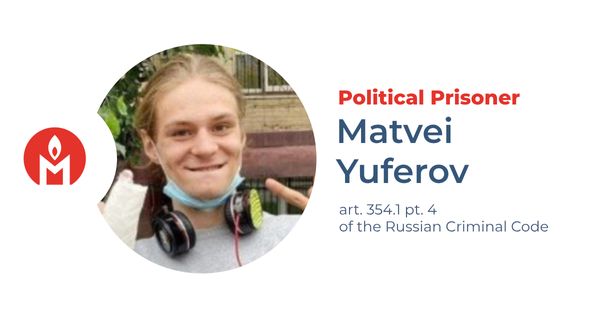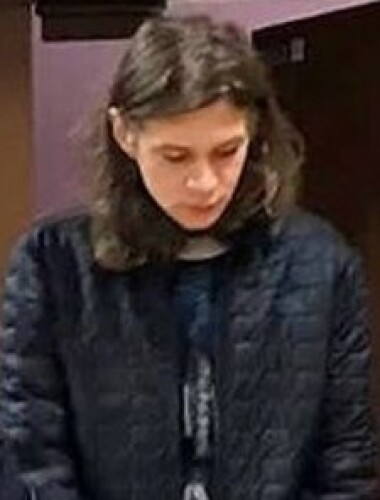Matvei Yuferov is a political prisoner
Matvei Yuferov was sentenced to four years in prison on charges of rehabilitating Nazism for urinating on a display that contained a veteran’s portrait
The human rights project ‘Political Prisoners. Memorial’, in accordance with international standards, considers Matvei Yuferov a political prisoner. He was convicted of denigrating the honour and dignity of a veteran of the Great Patriotic War by urinating on a display that contained a portrait of the veteran. He then published a photo of his act on social media. The punishment handed down to Yuferov is disproportionate to the gravity of the offence and the proceedings violated his right to fair trial.
We demand the release of Matvei Yuferov and that his criminal conviction be quashed.

What were the charges against Matvei Yuferov?
On the night of 24 November 2021, Matvei Yuferov, a student, met with friends in a Moscow bar and on his way home on Izmailovsky Boulevard urinated on a public display that contained a portrait of a World War II veteran. He posted a photo of what he had done on Instagram.
Yuferov subsequently deleted his post and published an apology, but Vladislav Pozdnyakov, founder of ‘Muzhskoe Gosudarstvo’ [the Male State] social media page that has been designated as extremist, published screenshots of the original publication on his Telegram channel.
Reports of what Yuferov had done attracted the attention of law enforcement officials, and the prosecutor’s office launched an investigation. On 27 November 2021, Yuferov was arrested on charges of rehabilitating Nazism by means of public desecration of a symbol of military glory and denigrating the honour and dignity of a veteran (Article 354.1, Part 4, of the Russian Criminal Code).
Yuferov pleaded guilty and described his action as an act of cynical hooliganism, but stated that he had never held extremist beliefs.
On 24 December 2021, Moscow City Court sentenced Yuferov to four years in a penal colony.
Why do we consider Matvei Yuferov a political prisoner?
We condemn Yuferov’s act as immoral. At the same time, in our view, the punishment handed down in his case – four years in a penal colony – is disproportionate to what he did.
It is absurd to attribute ideological motives to the deplorable behaviour of a drunken student.
The 2021 decision to increase the severity of the article of the Russian Criminal Code on the rehabilitation of Nazism was politically motivated. For decades, the Russian authorities have been seeking to monopolise memory of the Second World War, making it part of a State ideology that combines the characteristics of great-power chauvinism, militant revanchism and ideas of Russian superiority vis-à-vis the rest of the world. Today, these ideas help Russian propaganda provide ideological justification for the ongoing military aggression against Ukraine.
A detailed description of the case of Matvei Yuferov and the position of the Human Rights Project are set out on our website.
Recognition of an individual as a political prisoner does not imply the project, ‘Political Prisoners. Memorial,’ agrees with, or approves of, their views, statements, or actions.
How can you help?
If you have information concerning the whereabouts of Matvei Yuferov, his lawyer, relatives or support group, please let us know via email: [email protected]
You can donate to support all political prisoners
